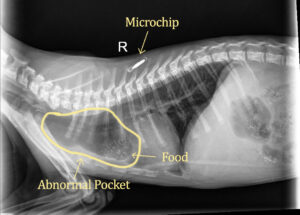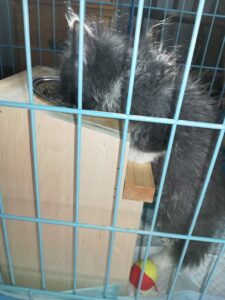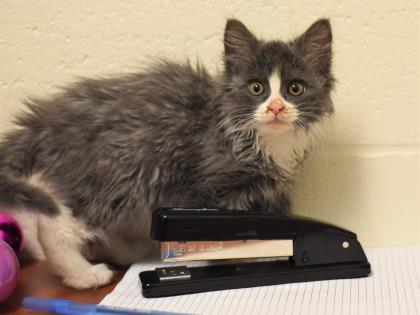Little 2-month-old “Reese 25” recently came to us with 30 members of his extended kitty family. Despite coming from a crowded home, most of the cats and kittens were in good health with the exception of a few minor ailments. Two had to have surgery to repair their entropion (a condition in which the eyelid turns inward so that the eyelashes and skin rub against the eye surface), one needed a hernia repaired, and all were spayed or neutered.
Reese was still a bit too young to be adopted, so he went to stay with Linda Bullis for a while. Linda discovered almost immediately that something was not right with Reese. He kept regurgitating his food each time he tried to eat and just couldn’t keep anything down. So off to Pleasantville Animal Hospital for x-rays to determine the cause.
 The x-rays revealed a case of megaesophagus. The esophagus is a tube that carries food and liquids from the mouth to the stomach and when functioning properly, a reflex causes contractions that propel its contents into the stomach. Another reflex prevents breathing during swallowing so that the cat will not inhale food or liquids into the lungs.
The x-rays revealed a case of megaesophagus. The esophagus is a tube that carries food and liquids from the mouth to the stomach and when functioning properly, a reflex causes contractions that propel its contents into the stomach. Another reflex prevents breathing during swallowing so that the cat will not inhale food or liquids into the lungs.
In cases of megaesophagus, these reflexes fail, and the esophagus will lose muscle tone and remain enlarged rather than contracting. Because foods and liquids cannot make their way into the stomach, a cat may regurgitate and begin to lose weight. In addition, foods or liquids that are inhaled into the lungs can cause aspiration pneumonia, which can be fatal if not treated promptly.
 There is no cure for megaesophagus, so the cat is supported. Food is typically placed at an elevated position so that the cat is standing on their hind legs while eating. This allows gravity to work in pushing the food into the stomach.
There is no cure for megaesophagus, so the cat is supported. Food is typically placed at an elevated position so that the cat is standing on their hind legs while eating. This allows gravity to work in pushing the food into the stomach.
Once we had a diagnosis, Linda’s husband, Gerry, researched plans online and lovingly built a custom feeding station – and it worked! After using it and holding Reese upright for a few minutes after eating, he kept his food down. Success!!
Reese is otherwise a normal kitten who enjoys playing and exploring his world. Due to the high risk for aspiration pneumonia and the lifelong care and commitment he will require, Reese was placed with a rescue who will find him a permanent home.
We would like to thank the team who stood behind Reese including Pleasantville Animal Hospital, Linda and Gerry Bullis, and members of the HSHC staff. Good luck, little man!
